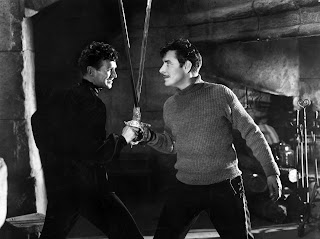 |
| Cary Grant and Deborah Kerr in the 1957 remake. |
That being the case, many people have argued - and rightly so - that despite Grant's superior performance and the more lavish production values, the remake feels somewhat hallow compared to the original. There are reasons for this, too. To start with the female lead was originally written for and performed by Irene Dunne (who, incidentally, had terrific chemistry with Grant in The Awful Truth, My Favorite Wife, and Penny Serenade which makes it especially a shame that they couldn't do the original together as planned), and she's absolutely perfect, blending just the right amount of humor and pathos - and doing her own signing with her light-lyric operatic soprano, unlike Deborah Kerr, who was dubbed in the remake and seems harder and more stilted in her acting style. Then there's the problem of pacing: the original seemed just right, telling its story in just under 90 minutes, whereas the 2-hour pace of the remake drags at times, especially in the second half. Most glaringly awful of these additional/updated scenes are the musical sequences with Kerr's elementary school class, which are corny without either being charming or adding anything to the narrative.
 |
| Irene Dunne and Charles Boyer in the 1939 original. |
So which to I really prefer? I can't really say. I grew up with the Cary Grant version and will always prefer his performance as the male lead, but I'm becoming fonder and fonder of the original as I get older, especially because I adore Irene Dunne. I therefore find myself in the most disagreeable position any arbiter of taste can be: that of being unable to say equivocally which has more merit. Both are equally worth watching, though, so my advice is simply to watch them both and decide for yourself.





